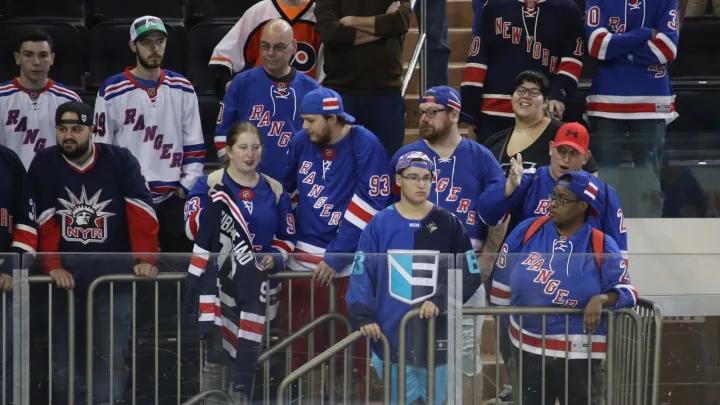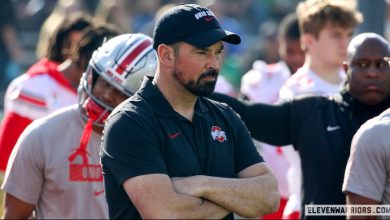Even though Rangers have played better in recent games, they should still be sold.

The New York Rangers, one of the most storied franchises in the National Hockey League (NHL), have had their fair share of ups and downs over the past few seasons. They’ve shown flashes of brilliance, with a roster full of skill and talent, but they have also faced challenges in their pursuit of consistent success. In the most recent stretch of games, the Rangers have found a groove and shown improved performances, but despite this, there is a growing argument that the team should still consider selling players and restructuring for the future.
The idea of selling in the middle of a season is often met with resistance from both management and fanbases alike, especially when a team has shown signs of improvement. After all, the Rangers have one of the most potent offenses in the league, with players like Artemi Panarin, Mika Zibanejad, and Chris Kreider lighting up the scoreboard on a regular basis. Their defense has its moments of brilliance, and Igor Shesterkin remains one of the league’s top goaltenders. However, the question remains: can they truly compete for a Stanley Cup this season? And if not, does it make sense to hold on to aging players and possibly risk another year of mediocrity, or should they look to the future and make some significant moves?
In this article, we’ll delve into why the Rangers, despite their recent surge, should consider selling. It’s about making tough decisions now to ensure long-term success. The future of the franchise depends on making calculated, strategic moves. Let’s explore why the Rangers, even with a recent uptick in form, may still be better off shifting their focus toward rebuilding, rather than staying all-in on this season.
1. Inconsistent Play and Lack of True Contender Status
While the Rangers have had stretches of solid play, they still have not demonstrated that they are a bona fide contender in the Eastern Conference. Despite their impressive offensive output, the team has shown glaring weaknesses in other aspects of their game — most notably in consistency and defensive play. One of the key reasons for this is the team’s inconsistency in net. Igor Shesterkin, for all his brilliance, has faced his share of challenges this season. His numbers, while still strong, have taken a slight dip compared to his Vezina-winning campaign.
In addition to goaltending struggles, the Rangers have also dealt with inconsistency in their defensive pairings and penalty kill. Players like K’Andre Miller and Jacob Trouba have at times looked unsure, and while Adam Fox remains one of the best defensemen in the league, he can only do so much to stabilize the back end. The Rangers’ defense has been prone to lapses in coverage and turnovers, leaving Shesterkin exposed. These are not qualities that scream championship contender. While the Rangers can score in bunches, their inability to lock down games when they’re ahead is concerning.
As much as Rangers fans would love to believe that they’re one or two moves away from competing for a Stanley Cup, the truth is that there are too many question marks. They’re still inconsistent and not yet built to withstand the playoff grind of the toughest teams in the East, including the likes of the Boston Bruins, Tampa Bay Lightning, and Carolina Hurricanes. When evaluating the team’s current standing, it becomes clear that this year’s squad might not be ready to go all the way, even with their offensive firepower.
2. The Window for a Championship Is Narrowing
One of the most compelling reasons to sell, even though the Rangers have been better recently, is the reality of their championship window. The Rangers are undoubtedly a team with talent, but they’re also operating on a ticking clock. Aging veterans, such as Kreider and Zibanejad, are in their prime years now, but these players won’t be at this level forever. They also have long-term cap implications, which will limit their ability to improve the roster through free agency or re-sign other key players.
Kreider, for instance, is on the wrong side of 30, and while he remains an important part of the Rangers’ offense, his best years are likely behind him. His physicality and net presence will always be valuable in the postseason, but how much longer can he maintain his current level of play? Zibanejad, another cornerstone of the Rangers’ offense, is a key piece, but there are growing concerns about his consistency in the postseason and whether he can lead this team to a Cup win. Similarly, some of the Rangers’ other veteran players, like Trouba, are showing signs of wear, and their value could be higher now than it will be in a few years.
If the Rangers are serious about building a championship-caliber team, they may need to trade away some of these players — while their value is still high — and acquire assets for the future. Whether that means picking up draft picks, young players, or prospects that can grow with the team, selling off some veteran pieces could be a way to revitalize the squad for the long-term, even if it means taking a step back this year.
3. Uncertainty Surrounding the Goaltending Situation
Goaltending is arguably the most important position in hockey, and for the Rangers, Shesterkin has been their backbone for the past few years. However, this season, his performance has been somewhat uneven. While Shesterkin is undoubtedly a top-tier goaltender, there have been moments where he has looked less than invincible, and backup goaltender Jaroslav Halák has not been a reliable enough option to carry the load when Shesterkin is out.
The goaltending situation, as crucial as it is, could be a reason to rethink the team’s immediate future. If Shesterkin’s play does not improve or if there are doubts surrounding his ability to perform in the postseason, the Rangers might need to consider rebuilding their roster around the assumption that they will need a new goaltending strategy. There is a long-term question about whether they can continue to rely on Shesterkin as the anchor, or whether it may be better to cash in on him for an even bigger return and build for the future, knowing that their goaltending situation could be volatile in the coming seasons.
4. The Cap Crunch Is Looming
The Rangers are already in a difficult salary cap situation, with several key players on expensive contracts. The cap constraints are only going to become more challenging in the coming years, especially with the looming extensions of players like Filip Chytil and K’Andre Miller, both of whom are poised to receive significant raises. With those raises, combined with the existing contracts of players like Panarin and Zibanejad, the Rangers may find themselves in a situation where they have little room to maneuver and improve the team.
In such a scenario, the best course of action could be to move on from some of their higher-priced veterans and focus on clearing cap space for the future. By selling off players now, particularly those who are in the final years of their contracts, the Rangers can build a more flexible roster moving forward, with room to add future pieces to their squad.
5. The Value of Future Assets and Prospects
Finally, one of the most compelling reasons to sell is the long-term benefit of accumulating assets. The Rangers have a talented core, but the reality is that building a true Stanley Cup contender requires a deep pipeline of prospects and draft picks. The Rangers have made moves in recent years to build up their prospect pool, but they still need more youth and depth to become a true powerhouse.
By selling off veterans like Kreider, Trouba, or even Panarin (if the right offer comes along), the Rangers could bring in prospects, future draft picks, or even young NHL-ready players. These assets could help them better position themselves for a Cup run in the coming seasons, rather than pushing all their chips in now when the team is still facing too many inconsistencies.
A Difficult but Necessary Decision
It’s never easy to embrace a rebuilding phase, particularly when a team has a talented roster and has shown signs of life. But despite the Rangers’ improved play in recent games, it’s important to recognize that they are not yet a complete team. Their window to compete for a Stanley Cup is narrowing, and a deeper dive into their long-term future shows that the smart decision might be to sell off veterans, recoup assets, and position themselves for a brighter tomorrow.
Peter Laviolette and the Rangers’ front office may not want to make such a drastic decision, but the reality of the situation is clear. They’re a talented team that’s not yet ready to win it all — and it’s better to make a move now while they still have valuable assets to trade, rather than holding on to the hope of a playoff run this season. The Rangers’ future will be brighter if they make the hard decision to sell, focus on building a more complete roster, and avoid squandering their championship window with short-term fixes. It’s time to think long-term, and that means making some tough moves to ensure sustained success.









